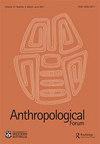清真寺和伊玛目:印尼东部的日常伊斯兰教
IF 0.9
3区 社会学
Q3 ANTHROPOLOGY
引用次数: 0
摘要
房地产市场真的无法为任何社会的穷人提供足够体面、合法、负担得起的居住场所吗?答案当然取决于我们认为有多少人是“穷人”,多少住房是“足够”的,以及我们愿意将哪些住房定性为“体面”和“负担得起”。本书没有对这些关键术语作出任何特定的定义。结果就是模棱两可。例如,有些段落似乎主张一种特定的、实质性的"体面"住房概念,不仅包括享有一定数量的安全、健康和个人尊严的权利,而且还包括组建自主家庭的权利(见214)。其他段落似乎退回到一个弱得多的主张,即体面住房的某些标准是最低限度必要的,但这一标准的具体内容应留给当地规范(70)。这一说法的最有力和最弱版本之间的差异,可能会对我们如何解读本书的论点产生重大影响。在一个极端的情况下,我们可能会把《破碎的城市》解读为暗示了一个大胆的论点,即大规模的社会住房将是确保未来城市中人类物种繁衍的必要条件。在另一个极端,我们可能会把它理解为仅仅意味着一些人的收入低于中等收入人群,因此买不起符合中等收入人群为自己设定的标准的住房。尽管有这些批评,我还是觉得《破碎之城》是一本令人兴奋的读物。我将重新阅读这本书,作为案例研究,我会考虑把它作为一本相对来说没有行话的介绍,介绍一个重要的激进的住房观点。我会向世界上任何研究住房或城市定居过程的人推荐《破碎的城市》。本文章由计算机程序翻译,如有差异,请以英文原文为准。
Mosques and Imams: Everyday Islam in Eastern Indonesia
it true that housing markets can never provide poor people in any society with enough decent, legal, affordable places to live? The answer surely depends on how many people we count as ‘poor’, how much housing is ‘enough’, and which housing we are willing to characterise as ‘decent’ and ‘affordable’. The book does not commit to any particular definitions of these key terms. The result is ambiguity. Some passages, for example, appear to assert a particular, substantive conception of ‘decent’ housing, comprising not only rights to certain quanta of safety, health, and personal dignity, but also the right to form autonomous families (see 214). Other passages appear to retreat to the much weaker assertion that some standard of decent housing is minimally necessary, but that the specific content of this standard should be left to local norms (70). The difference between the strongest and weakest versions of this claim could matter a great deal for how we interpret the book’s argument. At one extreme, we might read Broken Cities as implying the bold thesis that large-scale social housing will be necessary to ensure the reproduction of the human species in our urban future. At the other extreme, we might interpret it as implying merely the claim that some people have less income than middle-income people, and therefore cannot afford housing that is up to the standards that middle-income people would set for themselves. These critical remarks notwithstanding, I found Broken Cities to be a stimulating read. It is a book that I will re-read for the case studies, and that I would consider assigning to students as a comparatively jargon-free introduction to an important radical perspective on housing. I would recommend Broken Cities to anyone studying housing or urban settlement processes anywhere in the world.
求助全文
通过发布文献求助,成功后即可免费获取论文全文。
去求助
来源期刊

Anthropological Forum
ANTHROPOLOGY-
CiteScore
3.60
自引率
10.00%
发文量
14
期刊介绍:
Anthropological Forum is a journal of social anthropology and comparative sociology that was founded in 1963 and has a distinguished publication history. The journal provides a forum for both established and innovative approaches to anthropological research. A special section devoted to contributions on applied anthropology appears periodically. The editors are especially keen to publish new approaches based on ethnographic and theoretical work in the journal"s established areas of strength: Australian culture and society, Aboriginal Australia, Southeast Asia and the Pacific.
 求助内容:
求助内容: 应助结果提醒方式:
应助结果提醒方式:


